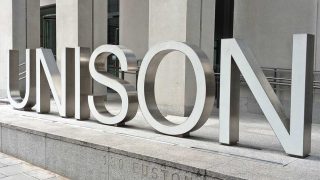In a meeting dominated by preparations for the first in-person national delegate conference since before the pandemic, there were still plenty of opportunities to discuss the issues affecting members as UNISON’s NEC met today.
General secretary Christina McAnea highlighted the cost of living crisis and the union’s campaigning on it, together with ongoing pay disputes and the need for the union to mobilise at the big TUC march and rally in June.
In her report to the NEC, the general secretary said: “We’re campaigning on the cost of the living and the cost of working. Rishi Sunak’s sweeping promises don’t stand up to scrutiny, with families now facing the steepest drop in living standards since the 1970s – we continue to give members all the information they need.”
On the summer demonstration, the NEC heard how the union is working with the TUC, to prepare for demos all over the UK and a rally in Parliament Square on Saturday 18 June.
The union will once again be taking to the streets to demand action on the cost of living – a new deal for working people – and a pay rise for all workers, as over a quarter of a million people are expected at the London demo alone.
Elsewhere, the meeting heard how the general secretary joined higher education staff on the picket line last month, as members took further action on pay and pensions at nine universities.
In her report to the NEC she highlighted how pay had fallen by nearly 20% over the past 12 years, with thousands of staff being paid less than the real living wage.
Ms McAnea also reported that industrial action due to take place on 29 and 30 March in the long-running Glasgow equal pay dispute had been suspended due to a significant breakthrough. Possible action on 20 and 21 April could still take place if “we need to revert to our industrial strategy”.
The NEC also heard that the union had condemned the actions of the Westminster government in ending the infection control fund for the adult social care sector in England.
The governing body also heard that the union has spoken out against the government’s reckless decision to withdraw most COVID-specific guidance for education and childcare settings.
The union had been receiving reports of care employers putting pressure on care workers to come into work when they are COVID positive. The meeting heard that the union will be working with other organisations across the social care sector to try and force the government into a U-turn.
The general secretary also reminded the NEC that, along with three other trade unions, UNISON has submitted a joint pay claim to the employers in the water, environment and transport service group.
Fears of rising fuel and energy costs and inflation, along with a 0% pay uplift in the 2021/22 pay round because of government pay policy, has led to a creative approach for this year’s pay round.
Finally, with thoughts of the union’s national delegate conference in June, the NEC agreed that they would prioritise motions and debates, amongst others, on:
- building the union;
- combatting discrimination;
- learning the lessons from COVID;
- a national care service;
- the cost of living crisis;
- global vaccine inequality,
- migrant workers and
- effective industrial action.




